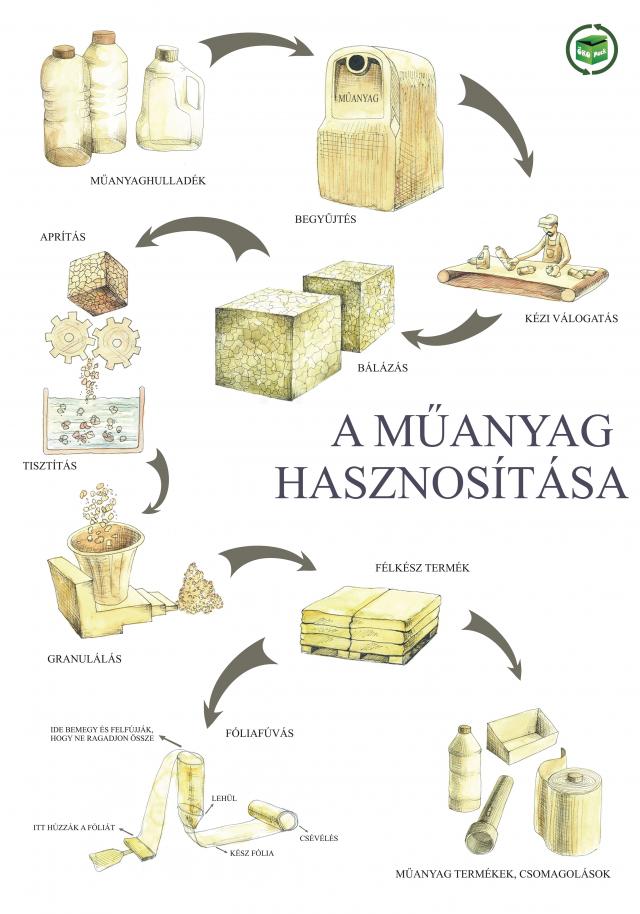Unless you've spent the last decade on a desert island, you've probably heard about the huge damage single-use plastics do to the environment. We are almost literally drowning in plastic: according to Greenpeace, a truckload of plastic waste is dumped into the oceans every minute. Without an ocean, this may sound far-fetched to us, but microplastics are already detectable in our rivers and even in tap water. So there is no question that we need to find a better alternative to packaging. We believe the solution lies in recycling, and we'll even show you why using recycled plastic is the best solution!
Recycling is the key to a sustainable future
The primary aim of recycling is to reduce the amount of waste generated, but it is also very important that new products can be produced in a more environmentally friendly way.
And why is this so important? As an illustration, we present some thought-provoking data:
- environmental damage caused by plastics is one of the most well-known environmental issues.
- if the entire population of the Earth weighed in, we would weigh 316 million tonnes. By contrast, we have so far produced 6.3 billion tonnes of plastic.
- 5 trillion pieces of plastic litter the oceans. That's enough to wrap around the entire planet Earth 400 times.
- it takes around 450 years for plastic to fully decompose once it is thrown away, so it is no wonder that plastic pollution is one of our most pressing problems.
So it is clear that to protect our future, we need to start recycling.
Why choose recycled plastic?
In the fight for a sustainable future, there are several alternatives to packaging. Why do we say we believe in recycled plastic? In short: because it has the smallest ecological footprint. To elaborate, let's look at the pros and cons of the possible alternatives:
Glass
The big advantage of glass jars, once you've bought them, is that you can refill them again and again, so you can even eliminate the packaging issue altogether for a while.
So what could be the downside? On the one hand, the weight: since glass is much heavier than plastic and aluminium cans, it requires much more energy to transport. And secondly, research shows that even after repeated recycling, glass has the highest greenhouse footprint. It takes about 20-25 refills to compete with PET bottles for green solutions.
Aluminium
Just like glass, aluminium can be recycled infinitely, as shown by the fact that, according to the Aluminium Association, nearly 75% of the aluminium ever produced in the world is still in use today.
Here too, the problem is more in the manufacturing process: aluminium cans are made from bauxite, which is mined in a far from environmentally friendly way. Moreover, it is estimated that the production process produces almost twice as many greenhouse gases as plastic.
Plastic
Unlike the previous two, plastic can be recycled only a few times, but at least the process requires much less energy. As it weighs about 40 times less than glass and is space-saving, it requires much less energy to transport and has a much lower greenhouse gas emission rate.

Source from
And in recent years, people's views on this have changed significantly: there are more and more conscious consumers and sustainable companies who want to take action for the future of our planet.
According to European Union statistics, in 2019, the average European used 34.4 kg of plastic per year, of which 14.1 kg was recycled plastic - a huge increase compared to previous years!
Increasing recycling is also one of the EU's targets, with 41% of all plastic packaging now going to this destination. Interestingly, Lithuania is the EU country with the highest recycling rate, recycling 70% (!) of all plastic packaging.
We still have a lot of room for improvement in this area, but surveys show that 33% of plastic packaging is recycled in this country.

Source from
So what is the conclusion?
At an individual level, the most you can do is to consciously buy recycled products and take care of your own selective waste collection. What's more, you can also significantly reduce your ecological footprint by choosing domestic brands, as this means much shorter delivery times.
Among the Hungarian eco-cleaning products, the following also stand out CYCLE products, which are made using recycled water and natural, environmentally friendly substances such as acetic acid and citric acid. And apart from the nozzle or cap, their packaging is also made of recycled plastic.




















